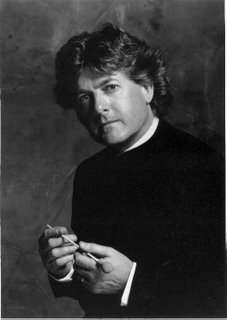 The – in this case anonymous – brass fanfares that the Baltimore Symphony Orchestra opens its concerts at Strathmore with, serve several purposes at once: they expose the musicians a bit more (and doing that by what they do best: play music), it’s a more effective last call for the audience to be seated than the regular gong and light-flickering, and it allows people to be a minute or two late without missing or interrupting the flow of the program. It was also the kind of entrance that James Judd – substituting at short notice for Maestro Termirkanov – enjoyed when he hopped onto the podium. (He also stepped in for Temirkanov last season at the Vadim Repin concert.)
The – in this case anonymous – brass fanfares that the Baltimore Symphony Orchestra opens its concerts at Strathmore with, serve several purposes at once: they expose the musicians a bit more (and doing that by what they do best: play music), it’s a more effective last call for the audience to be seated than the regular gong and light-flickering, and it allows people to be a minute or two late without missing or interrupting the flow of the program. It was also the kind of entrance that James Judd – substituting at short notice for Maestro Termirkanov – enjoyed when he hopped onto the podium. (He also stepped in for Temirkanov last season at the Vadim Repin concert.)Prokofiev’s Suite from The Love for Three Oranges opened the Prokofiev/Strauss program - and was played with willingness and thoroughness by the orchestra that suggested that they wanted to make sure not to let their ersatz-conductor down. Just like under Andrew Constantine the playing may not have been ‘crazy-special’ but solid (in the best sense) and very good sounding. The actual opera The Love for Three Oranges is performed far less than its quality would merit, but at least parts of its suite are fairly well known, especially its concluding March that will sound familiar even to those who don’t think they know it. The “little BSO” exerted plenty of drive to bring it home with jaunty steps.
Joe Banno, Baltimore Symphony Orchestra (Washington Post, March 13) |
Who can ever have enough of Ein Heldenleben? Even four hours after the BSO’s Till Eulenspiegel and about four weeks after the Concertgebouw’s Hero’s Life. Admittedly and expectedly, it didn’t top Jansons’ phenomenally sounding performance. It wasn’t as cohesive, the entries not as precise (double basses in the beginning being but one of the more obvious examples), the notes not all as audible and the colors less vivid. The beginning was nice and tight, the end quite exciting again – and in the middle was an increasingly tame and unexciting performance that was good but not great. Still, to have kept my attention throughout just after the “real” BSO’s performance earlier in the day it must have been and indeed was an enjoyable concert, well above average.